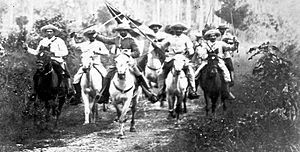Battle of Ceja del Negro facts for kids
Quick facts for kids Battle of Ceja del Negro |
|||||||
|---|---|---|---|---|---|---|---|
| Part of Cuban War of Independence | |||||||
 The main cavalry charge during the battle |
|||||||
|
|||||||
| Belligerents | |||||||
| Commanders and leaders | |||||||
| Strength | |||||||
| 1,000 Mambises | 2,000 Infantry | ||||||
| Casualties and losses | |||||||
| Unknown | Around 500 | ||||||
The Battle of Ceja del Negro was an important fight during the Cuban War of Independence. It happened on October 4, 1896. In this battle, soldiers from three different groups fought: foot soldiers (infantry), horse riders (cavalry), and those using cannons (artillery). Cuban forces were led by brave generals Antonio Maceo and Juan Rius Rivera. The Spanish troops were commanded by Colonel Granados.
Fighting at Ceja del Negro
The Cuban soldiers were moving slowly because they were also protecting many civilians. The battle started early in the morning, around eight o'clock. It continued all day until about five in the afternoon. General Maceo's troops kept fighting the last Spanish positions. One important Spanish spot was called El Guao, located near the Ceja del Negro hill.
Even though the Spanish army had more soldiers and better weapons, they could not win the battle. However, Colonel Granados used cannons to fire at the river crossing where the Cubans were. This caused many injuries, especially among the people who were not soldiers.
What Happened Next
General Maceo's victory at Ceja del Negro made the Spanish leader of the island, Valeriano Weyler, speed up his plans. He wanted to gather the Cuban civilians into special camps. His goal was to separate the independence fighters from the farmers who supported them.
See also
 In Spanish: Batalla de Ceja del Negro para niños
In Spanish: Batalla de Ceja del Negro para niños
 | Victor J. Glover |
 | Yvonne Cagle |
 | Jeanette Epps |
 | Bernard A. Harris Jr. |

